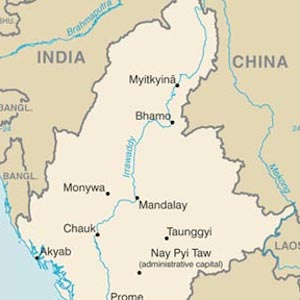
While many in the gem industry call the recent military coup in Myanmar (formerly Burma) a terrible tragedy, they also fear what will happen to the country’s gemstones in its wake.
On Thursday, the U.S. Treasury Department’s Office of Foreign Assets Control (OFAC) sanctioned three gemstone and jade companies—Myanmar Ruby Enterprise, Myanmar Imperial Jade Co., and Cancri (Gems and Jewellery) Co.—it said were connected to the country’s military. That means those three companies are not allowed to do business in the United States, or with U.S. companies. (The full list of recently sanctioned entities and individuals from Myanmar can be seen here.)
But it’s still not clear how that rule will be enforced, and what the industry’s new responsibilities are.
“We, along with everyone else, are trying to figure out what this means,” says Doug Hucker, CEO of the American Gem Trade Association (AGTA). “A military coup doesn’t bode well for Myanmar or for our industry. There’s no question that these sanctions will hurt our industry. What people have to decide is, do they help the greater good overall?
“Ruby is not the bad guy. The government is the bad guy. But we don’t run the government there, or here. And we have no idea what will happen going forward.”
In fact, many think that, if the situation in Myanmar doesn’t improve, future actions may come—including, possibly, an outright ban on gemstone imports from Burma. (The country is best known for producing rubies but produces other gemstones as well.)
There is, of course, a precedent for this. For eight years, the Tom Lantos Block Burmese JADE Act banned all U.S. imports of Burmese rubies and jade. That legislation was not particularly controversial in Washington, D.C.—it received bipartisan support in the House and Senate in 2008, and when President Obama extended the ban by executive order in 2013, one NGO noted the move garnered no real opposition.
However, many in the gem industry hated the JADE Act, arguing it primarily hurt small miners.
“The [gemstone ban] only hurt the little people, the miners, their communities,” says Edward Boehm, owner of Chattanooga, Tenn.-based gem dealer Rare Source. “It didn’t hurt the corporations at all.”
In 2015, Aung San Suu Kyi was elected the country’s leader, and some hoped she would lead Myanmar into a new era. The U.S. gem ban was lifted in 2016.
Still, the military retained significant control of the country, including a large part of the colored-stone sector. When military leaders staged a coup on Feb. 1, some thought it was just a matter of time before the gem industry was again dragged into the ongoing tumult.
“I don’t think this is a surprise to anyone,” says Jeffrey Bilgore, former president of the AGTA, who visited the country in 2016. “A military coup is a terrible thing. The will of the people was clearly expressed.”
He says he’s happy that these new sanctions only affect specific companies.
“Last time, they sanctioned the whole industry,” he says. “This time, at least, the sanctions are targeted.”
Still, just as the Burma ban increased the paperwork burden for all ruby imports, some fear these sanctions will make it harder to source Burmese ruby in general—especially since it can be difficult to prove what country a gemstone comes from, never mind what mine produced it.
“When you have a large high-value gemstone, you might be able to trace a provenance around it,” says Hucker. “But with smaller goods, it’s a lot harder problem.”
One ongoing hurdle is that the gemstone sector in Myanmar remains opaque. Because the country’s laws prohibit the export of loose gemstones, most Burmese gems are smuggled into Thailand, says Kennedy Ho, chairman of the Bangkok-based Asian Institute of Gemological Sciences, who is in regular touch with people in Myanmar.
For that reason, it’s not clear how big these three sanctioned companies are. NGOs have long argued that the gem sector has been a cash cow for the military.
But Ho says that most of the gemstone mining is currently done by small dealers, as for the last two years the bigger operations have been held up by license issues.
Regardless, right now, mining is at a virtual halt, as most of the miners are out in the streets protesting, he says.
Going forward, Ho doesn’t think the ban will particularly affect the jade market, as most of the gems are sold to China, which has powerful become more economically in the years since the first ban expired. But it could affect rubies, although he thinks that many of them will also be sold in China.
And while Ho feels the current sanctions are “better than nothing,” he doesn’t think the military will ultimately be hurt by them, given how much of the country it still controls.
“The generals are loaded already,” he says. “They have the best plots of land, the telecommunications system, the banking system—it’s all in their hands.”
Still, despite nationwide protests—and widespread international condemnation—Ho fears the current junta will be difficult to dislodge.
“Once they taste power, they are tough to get rid of,” he says.
(Image courtesy of U.S. State Department)
- Subscribe to the JCK News Daily
- Subscribe to the JCK Special Report
- Follow JCK on Instagram: @jckmagazine
- Follow JCK on X: @jckmagazine
- Follow JCK on Facebook: @jckmagazine







